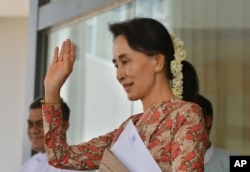The Obama administration's decision to continue certain sanctions on Myanmar will not harm the Southeast Asian country, according to Myanmar State Counselor and Foreign Minister Aung San Suu Kyi.
On Tuesday, the Obama administration further eased financial sanctions on Myanmar to support the nation's political reforms and economic growth, and to facilitate U.S. trade with the country, also known as Burma.
But the U.S. also extended other sanctions in an effort to thwart human rights abuses and military trade with North Korea.
In her first public remarks on the extension of some sanctions, Aung San Suu Kyi told a Wednesday news conference in Myanmar they are "not a big problem and will not hurt us in any way. We have the strength and the means to overcome any obstacles that may be imposed," reported Channel NewsAsia.
Aung San Suu Kyi added that the U.S. is a "good friend" and will remain as such with Myanmar.
Senior U.S. officials announced the decisions Tuesday, days ahead of Secretary of State John Kerry's May 22 visit to Naypyidaw.
Seven state-owned Myanmar enterprises and three state-owned banks are being removed from the blacklist, according to amendments by the Treasury Department in consultation with the State Department.
Other regulatory amendments include general license to authorize trade-related transactions and personal transactions related to Americans residing in Myanmar. Those changes are intended to facilitate trade and the movement of goods within Myanmar.
The U.S. left in place, though, sanctions on Myanmar's powerful military, because of its major economic interests.
Barred businesses
It updated the so-called Specially Designated Nationals and Blocked Persons (SDN) list, to add six companies to be barred from U.S. business dealings. The businesses are owned 50 percent or more by Steven Law, a tycoon accused of ties to the military and the heroin trade through a corporation called Asia World.
The remaining sanctions on individuals and entities primarily target those who obstruct political reforms, commit human rights abuses in Myanmar, or propagate military trade with North Korea.
Former U.S. Chief of Mission in Myanmar Priscilla Clapp told VOA that while Washington is restructuring the remaining financial sanctions, individuals and entities should be targeted to promote better behavior.
Among seven state-owned enterprises removed from the blacklist are Myanmar Pearl Enterprise and Myanmar Gem Enterprise. But senior U.S. officials said a ban on the import of jadeite and rubies, one of Myanmar's most profitable industries, remains in place.
The latest U.S. actions follow a landmark November election in which the party of long-time democracy activist Aung San Suu Kyi, a Nobel Peace Prize laureate, won a one-sided victory, ending decades of military rule.
In a message to the U.S. Congress, President Barack Obama said Myanmar has made significant reforms since 2011 when it first formed a civilian government. He also said "concerns persist regarding continued obstacles to full civilian control of the government, the ongoing conflict and human rights abuses in the country, particularly in ethnic minority areas, and military trade with North Korea."









